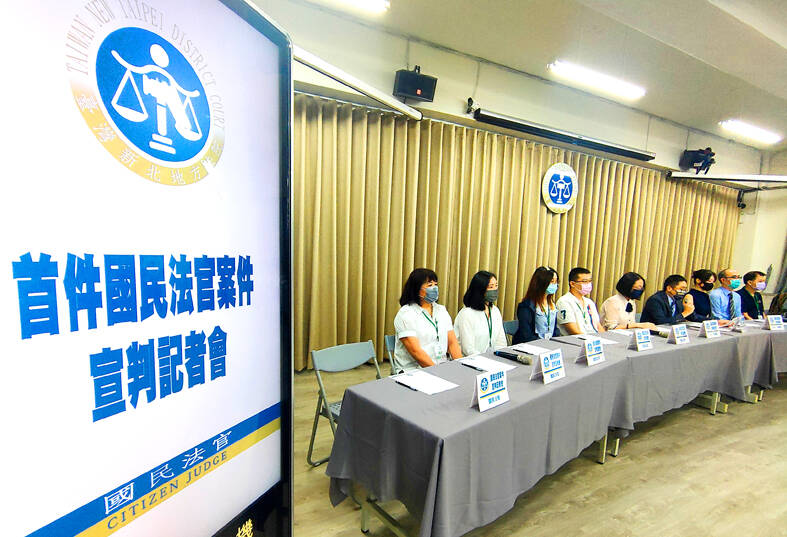The New Taipei City District Court yesterday sentenced a woman to seven years and two months in prison for murdering her husband in Taiwan’s first-ever criminal case to be tried by a mixed collegiate bench of lay and professional judges.
Taiwan began assigning lay judges with the implementation of the Citizen Judges Act (國民法官法) on Jan. 1.
A woman surnamed Chi (季), aged 63, was accused of stabbing her husband, surnamed Fan (范), aged 72, in his sleep on the evening of Nov. 30 last year.

Photo: Wang Yi-sung, Taipei Times
She confessed to the killing but pled for leniency on grounds of diminished capacity by mental duress and pitiable circumstances respectively under Article 19 and Article 59 of the Criminal Code, the court said in the verdict.
The prosecution did not contest the part of the defense’s case arguing that Chi’s voluntary surrender to the authorities qualified the defendant for sentencing mitigation, it said.
Chi claimed to be a victim of chronic domestic abuse by the deceased, which the prosecution also did not dispute, it said.
The prosecution contended that the accused was not acting under extreme mental duress at the time of the killing and her circumstances, albeit worth of sympathy, did not entitle her to further reductions to her sentencing, it said.
The prosecution said that Chi would serve a shorter time in prison than the sentence for aggravated assault, if the court allowed further sentence reductions in addition to her voluntary surrender.
The collegiate bench accepted the prosecution’s argument saying, based on Chi’s psychiatric examination, her capacity was not diminished at the time of the murder, it said.
The examiner’s testimony indicated that Chi was aware that murder was against the law and that options other than that were available at the time of the crime, the court said.
The court rejected the plea to reduce Chi’s sentence due to pitiable circumstances, as her case does not meet the legal standard “the offense is so pitiable that even the minimum punishment is considered too severe.”
Therefore, the bench accepted the prosecution’s position that Chi should receive a prison term of between eight and 12 years, the court said.
The collegiate bench handed down the sentence — which was close to the minimum prison term demanded by the prosecution — after three days of deliberations.
The lay members of the bench have performed well in keeping their focus and being attentive to details, a legal expert who observed the case as part of the public audience said on condition of anonymity.
The lay judges repeatedly asked to examine the “gruesome” crime scene photographs and asked relevant questions, they said.
Though some of the questions posed by the lay judges can be construed as prejudicial, these missteps fall into the normal range of expectations, they said, adding that the system of lay judges was meant to empower ordinary citizens.

US President Donald Trump yesterday announced sweeping "reciprocal tariffs" on US trading partners, including a 32 percent tax on goods from Taiwan that is set to take effect on Wednesday. At a Rose Garden event, Trump declared a 10 percent baseline tax on imports from all countries, with the White House saying it would take effect on Saturday. Countries with larger trade surpluses with the US would face higher duties beginning on Wednesday, including Taiwan (32 percent), China (34 percent), Japan (24 percent), South Korea (25 percent), Vietnam (46 percent) and Thailand (36 percent). Canada and Mexico, the two largest US trading

China's military today said it began joint army, navy and rocket force exercises around Taiwan to "serve as a stern warning and powerful deterrent against Taiwanese independence," calling President William Lai (賴清德) a "parasite." The exercises come after Lai called Beijing a "foreign hostile force" last month. More than 10 Chinese military ships approached close to Taiwan's 24 nautical mile (44.4km) contiguous zone this morning and Taiwan sent its own warships to respond, two senior Taiwanese officials said. Taiwan has not yet detected any live fire by the Chinese military so far, one of the officials said. The drills took place after US Secretary

CHIP EXCEPTION: An official said that an exception for Taiwanese semiconductors would have a limited effect, as most are packaged in third nations before being sold The Executive Yuan yesterday decried US President Donald Trump’s 32 percent tariff on Taiwanese goods announced hours earlier as “unfair,” saying it would lodge a representation with Washington. The Cabinet in a statement described the pledged US tariffs, expected to take effect on Wednesday next week, as “deeply unreasonable” and “highly regrettable.” Cabinet spokeswoman Michelle Lee (李慧芝) said that the government would “lodge a solemn representation” with the US Trade Representative and continue negotiating with Washington to “ensure the interests of our nation and industries.” Trump at a news conference in Washington on Wednesday announced a 10 percent baseline tariff on most goods

THUGGISH BEHAVIOR: Encouraging people to report independence supporters is another intimidation tactic that threatens cross-strait peace, the state department said China setting up an online system for reporting “Taiwanese independence” advocates is an “irresponsible and reprehensible” act, a US government spokesperson said on Friday. “China’s call for private individuals to report on alleged ‘persecution or suppression’ by supposed ‘Taiwan independence henchmen and accomplices’ is irresponsible and reprehensible,” an unnamed US Department of State spokesperson told the Central News Agency in an e-mail. The move is part of Beijing’s “intimidation campaign” against Taiwan and its supporters, and is “threatening free speech around the world, destabilizing the Indo-Pacific region, and deliberately eroding the cross-strait status quo,” the spokesperson said. The Chinese Communist Party’s “threats